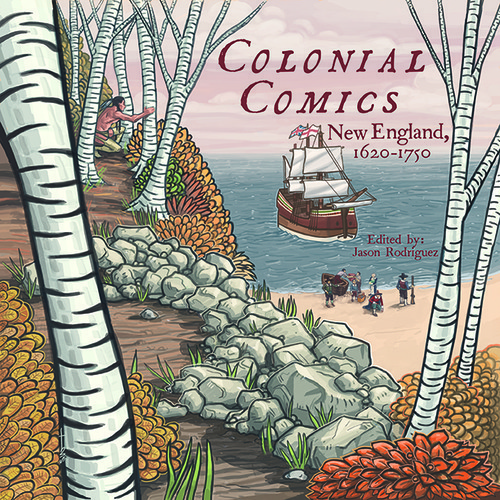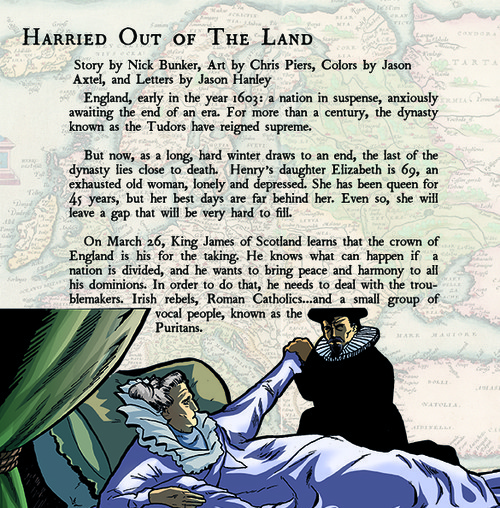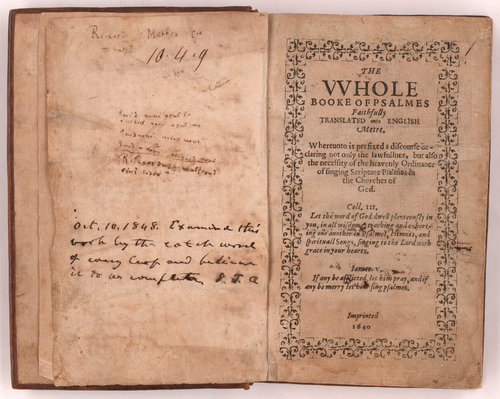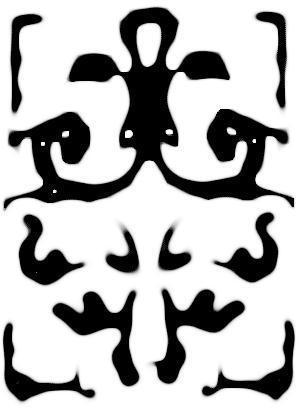Jason Rodriguez's Blog, page 7
November 4, 2014
http://www.ala.org/yalsa/ggnt/nominat...
I was reluctant to announce this since the website wasn’t updated yet, but Fulcrum just sent out an announcement so I think that gives me the go ahead…
Colonial Comics: New England, 1620-1750 is a 2014 nominee for the Young Adult Library Services Association’s (YALSA’s) Great Graphic Novels for Teens list! You’ll eventually see the book listed on this site, along with all of the other terrific nominees.
Big congrats to all of the creators and a huge thanks to wonderful folks at YALSA and the American Library Association!
So this is my big news of the month…so far.
October 20, 2014
Horror Month Day 14: Communion
I don’t even know if Communion is classified as horror but when I saw it at the age of 11 it was the most horrific thing of all time. This is before X-Files and Fire in the Sky and, for the most part, aliens in pop-culture were basically E.T and Mac and some humanoid creatures in cheesy suits from old sci-fi flicks. In COMMUNION, however, they were not like that. No – they had these terrifying heads and freakishly thin bodies and they didn’t talk to you, no, they experimented on you and showed you the death of your son and the end of the world. They represented these creatures from space that knew about our impending doom and wanted to shove probes up our butts to collect data before we all killed ourselves.
Over at the Robot’s Pajamas I say a couple of things about COMMUNION, the scariest movie you probably never seen.
October 16, 2014
colonialcomics:
Instructions of how to fold your very own...
Instructions of how to fold your very own origami Mayflower! The design was printed in Colonial Comics: New England, 1620-1750 but who wants to cut up their books? You can download a copy of the Mayflower here, print it out (make sure you print on both sides!), cut off the white border, and then follow the instructions in the video above. It’ll actually float!
I’ll be posting more activities and downloads on the Colonial Comics website over time. Enjoy!
By far the most popular bit of swag I bring to shows. Now you can make your own at home!
October 14, 2014
Apparently, booksellers are filling orders of Colonial Comics:...

Apparently, booksellers are filling orders of Colonial Comics: New England, 1620-1750. This is a very quick turn-around, as I just got copies of the book on Friday. But apparently pre-sales were pretty strong, so the books are going out. Here’s some press on the book to-date:
School Library Journal naming it a BEA Buzz Book
My interview with MHS and Comics DC.
Pull quotes:
This collection of stories about early New England will appeal to kids of all ages. These fascinating stories concern both well-known and little-known New Englanders, including settlers, slaves and Native Americans. We meet everyone from Anne Hutchinson to Yankee whalers. These engaging tales are beautifully illustrated and grounded in the latest scholarship. Highly recommended for kids of all ages! — Dr. Frank Cogliano, Professor of American History, University of Edinburgh
Jason Rodriguez has edited a visually attractive book that will encourage young readers to acquire a more meaningful understanding of Colonial America’s history by helping make the stories come alive.
— Julian L. Lapides, past president, Baltimore Heritage, Inc.
This book is smart, surprising, fun and educational. Each story has its own visual and verbal style but all will delight, intrigue, and enlighten both novice and expert alike. — James David Moran, Director of Outreach, American Antiquarian Society
And that’s it, so far. How am I doing? Well, I’m a wreck. But I’m usually a wreck, so it’s all good. Oh, and I made a website for the book. The downloads should be up by tomorrow at the latest. And a FaceBook page that you can “like” to receive updates.
Ok. That’s it.
August 27, 2014
Well, it looks like I can start talking a little bit about a big thing. The first phase in a science...
Well, it looks like I can start talking a little bit about a big thing. The first phase in a science program I am putting together has received unanimous approval from AAAS, and I will be working with them to curate an art show focusing on science and science fiction comic book art, scheduled for Fall 2015. AAAS is the publisher of SCIENCE, the premier peer-reviewed science weekly journal and I’m, well, I’m a guy that likes comic books and science.
If you would like to know more about this particular phase of the program, particularly to be kept up-to-date on how your artwork can be featured, please give me a shout. If you’d like to know more about the big picture for this program…well, also give me a shout.
Now that I can talk a bit about this part, I’ll start slowly rolling out some more details of what we have planned as they come together.
August 21, 2014
The Design of the Book Part III: This One Design Element
I’ve been posting three “Intro to the Book” posts a week on the Colonial Comics blog, and I haven’t been reblogging all of them here but I wanted to share this one, since it’s really about the theme of the book.
I like it when an anthology doesn’t feel like an anthology. I like it when there’s a central them to the book (in this case, colonial New England), laid out in a way that makes sense (in this case, chronologically), with interstitials and design elements that work to bring the book together and make it feel like one continuous story that just happens to be told by a collection of talented creators. In order to do that, I first come up with some focal point, of sorts - a visual queue that can bring everything back to a theme before launching into the next section or story.
This first book is all about establishing an American Identity. And part of it focuses on the bad stuff - the wars and the genocide, slavery and the treatment of women. But the book was never meant to give the impression that everything was evil, and that our very foundation was corrupt. I took a page from Sarah Vowell’s The Wordy Shipmates to make sure that these earlier years were painted as a bit more nuanced. Because behind the scenes, you did have some social reformers and big thinkers and people who bucked the status quo. And that idea of making a better country, although muted and fought against at first, is really the foundation of the American Identity. And even though we’ve had a tumultuous history, and even though we’re still not anywhere near where we could be, there is still this inherent desire to be better that’s rooted in a large portion of our population. And, over time, the good ideas tend to win out, and we get closer to that idealized American Identity.
It feels like we inch towards the finish line, and that the finish line is constantly moving as new knowledge is made available to us, and in the moment it feels like we still have so far to go, but taken over the course of almost 400 years…we’ve gotten a lot closer.
And what got us there? The ability to share ideas. And at first it was through town meetings and church assemblies, but we eventually started printing books and then newspapers and then magazines and eventually the internet comes along and now it becomes harder and harder to HIDE information, although it still seems like doing something with that information is sometimes impossible.
When I was a kid, my life was changed by EPCOT’s Spaceship Earth. That’s not an exaggeration. Before Spaceship Earth, I wanted to be a cowboy or a vampire hunter. After Spaceship Earth, I wanted to generate knowledge and share those ideas. It lead to two career paths, in a sense, one focused on science and one focused on writing. And in both of those paths, I had a core belief that sharing ideas and knowledge is a necessary part of the creation of an ideal society.
The Puritans, for all their faults, believed the same thing. They wrote down everything, and once they got a printing press they printed everything. And the first book that they printed was the Bay Psalm Book. And I decided that, since this first volume was ultimately about ideas, the Bay Psalm Book had to be the focal point of the design of this book.
So I grabbed a scan of the book, shown below…
…and I isolated that one squiggly design element from the book and reproduced it in glorious 300DPI…
…and then I used it. Over and over and over again. I used it on promo materials, I used it in interstials, I used it for the table of contents and the book guide and the reference section and the bios and acknowledgement pages. It was a tip-of-the-hat to the one thing that I feel will eventually bring us closer to that ideal American Identity. The desire within us to share everything we know, everything we feel, and everything we want.
But I doubt anyone will really see that unless I tell it to them…so, thankfully, it makes for a pretty fantastic border:
Colonial Comics: New England, 1620-1750 will be released in October from Fulcrum Books. You can pre-order it on Amazon now.
Previous Design Posts:
Cover Process
Intro PagesPrevious Story Posts:
Harried Out The Land by Nick Bunker, Chris Piers, Jason Axtell, and Jason Hanley.
Thomas Morton, Merry Mount’s Lord of Misrule by E.J. Barnes.
Troublesome Sows by Virginia DeJohn Anderson and Mike Sgier
Garden in the Wilderness by Matt Boehm and Ellen T. Crenshaw
The Trial of Anne Hutchinson by Alexander Danner and Matt Rawson
The Press’s Widow: Elizabeth Glover by Erika Swyler, Noel Tuazon, and Jason Hanley
Maverick Island by J.L. Bell and Joel Christian Gill
August 12, 2014
On a much more personal note, a little something about Robin Williams. He fell off my radar a bit in...
On a much more personal note, a little something about Robin Williams. He fell off my radar a bit in later years, I’d sort of groan when he had a comedy special come on and FACES OF OLD DOGS was one of my favorite websites for a while. But with his passing, I was instantly brought back to my teenage years, watching DEAD POETS SOCIETY on repeat and telling myself over and over and over again, “Avoid using the word ‘very’ because it’s lazy. A man is not very tired, he is exhausted. Don’t use very sad, use morose. Language was invented for one reason, boys - to woo women - and, in that endeavor, laziness will not do.”
Fast forward to college, watching GOOD WILL HUNTING with Robin back when we were just two kids who were getting to know each other and telling friends, “Sorry, guys; I gotta see about a girl.”
Rewind to my childhood, my dad would have Mork & Mindy on and although I didn’t understand most of the jokes, I still nanoo-nannoed with the best of them.
HOOK and MS. DOUBTFIRE, my awkward blind date to see WHAT DREAMS MAY COME.ALADDIN, of course, and working at the video store and falling for THE FISHER KING.POPEYE playing on Sunday mornings along with Harryhausen and Shaw Bros. flicks, becoming some of my early mainstays.
Robin Williams was, in some weird way, with me for most of my life. And he really did bring me a lot of a joy, making his passing a lot harder to take.
I don’t shy from the fact that I’ve been going to therapists since I was 16 years old. In fact, I have an appointment in a half hour for my weekly check-in. And with Robin Williams passing, I just want to take a moment to remind you all that depression is real, and that you need to support the people in your lives that suffer from it and appreciate every moment that you have with them. I forget to do that myself, sometimes. I am going to make a better effort not to do that anymore.
It doesn’t have to end like this. It never should.
"This collection of stories about early New England will appeal to kids of all ages. These..."
-
Professor Frank Cogliano, University of Edingburgh.
First blurb!
(via colonialcomics)
August 11, 2014
The First Four Stories in Colonial Comics
I don’t want to reblog each one, so here’re the features I posted for the first four stories in Colonial Comics: New England, 1620-1750.
Harried Out The Land by Nick Bunker, Chris Piers, Jason Axtell, and Jason Hanley.
Thomas Morton, Merry Mount’s Lord of Misrule by E.J. Barnes.
Troublesome Sows by Virginia DeJohn Anderson and Mike Sgier
Garden in the Wilderness by Matt Boehm and Ellen T. Crenshaw
Colonial Comics: New England, 1620-1750 will be released in October from Fulcrum Books. You can pre-order it on Amazon now.
July 30, 2014
colonialcomics:
Starting this week we will be introducing you...

Starting this week we will be introducing you all to the creators and stories in Colonial Comics: New England, 1620-1750.
The first story starts in England in 1603. This may seem like it’s outside the confines of the book, but any story about the British colonies has to start in England, with the death of Queen Elizabeth.The story was written by Nick Bunker (Making Haste From Babylon: The Mayflower Pilgrims and Their World: A New History, An Empire on Edge: How Britain Came to Fight America) and features pencils and inks from Chris Piers (Trickster and frequent author/illustrator for The Robot’s Pajamas), colors from Jason Axtell (Mr. Big), and letters by Jason Hanley (Elk’s Run, Postcards: True Stories That Never Happened).
In this tale, we follow the evolution of the first group of British citizens to colonize New England, from Puritan to separatist to Pilgrim, as they make their way from England to Holland and, eventually, America. When I started diagramming the stories in this book, I knew from the beginning that I wanted to start in England, and having read Making Haste From Babylon, I knew I wanted Nick Bunker to write the story. In my early years, the reason the Pilgrims left England was always due to this vague concept of “religious freedom,” the right to their own beliefs, something that was so central to the American Identity that it became the First Amendment of our Constitution.
But history paints a slightly different picture, one where the Pilgrims really wanted the freedom to practice their OWN religion, and where a large portion of the people who came to America on the Mayflower weren’t even Pilgrims. The former is important because it sets the stage for the Roger Williams and the Anne Hutchinsons of this story, the people who were banished from the Puritan colonies, and the latter is important because it reminds us that, for the most part, traveling to America was a money-making opportunity for many of the people who came over.
I think the story does a good job of setting the stage for this book. Colonial American history is complicated, and in our younger years we tend to be given caricatures of the people who came over. Men dressed in black with buckled hats. A helpful Native American who, after Thanksgiving, disappeared from our country’s origin story. Women who were largely non-existent. Fast-forward to something about witches. Fast-forward to a revolution, Freedom of Religion, etc.
Fast-forwarding the details to get to big ideas and simplistic representations of people who, at the end of the day, were individuals. And, as with all individuals, some of them had ideas, dreams, and stories that broke away from the caricatures we assign to them.
Colonial Comics: New England, 1620-1750 will be released in October from Fulcrum Books. You can pre-order it on Amazon now.






